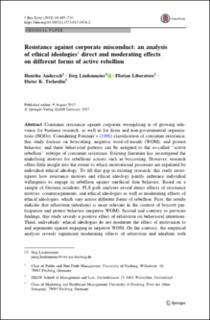Please use this identifier to cite or link to this item:
https://doi.org/10.21256/zhaw-3988| Publication type: | Article in scientific journal |
| Type of review: | Peer review (publication) |
| Title: | Resistance against corporate misconduct : an analysis of ethical ideologies’ direct and moderating effects on different forms of active rebellion |
| Authors: | Andersch, Henrike Lindenmeier, Jörg Liberatore, Florian Tscheulin, Dieter K. |
| DOI: | 10.21256/zhaw-3988 10.1007/s11573-017-0876-2 |
| Published in: | Journal of Business Economics |
| Volume(Issue): | 88 |
| Issue: | 6 |
| Page(s): | 695 |
| Pages to: | 730 |
| Issue Date: | 2018 |
| Publisher / Ed. Institution: | Springer |
| ISSN: | 0044-2372 1861-8928 |
| Language: | English |
| Subjects: | Business ethics; Consumer resistance; Corporate wrongdoing |
| Subject (DDC): | 170: Ethics 658: General Management |
| Abstract: | Consumer resistance against corporate wrongdoing is of growing relevance for business research, as well as for firms and non-governmental organizations (NGOs). Considering Fournier’s (NA – advances in consumer research, vol 25, Association for Consumer Research, Provo, 1998) classification of consumer resistance, this study focuses on boycotting, negative word-of-mouth (WOM), and protest behavior, and these behavioral patterns can be assigned to the so-called ‘‘active rebellion’’ subtype of consumer resistance. Existing literature has investigated the underlying motives for rebellious actions such as boycotting. However, research offers little insight into the extent to which motivational processes are regulated by individual ethical ideology. To fill this gap in existing research, this study investigates how resistance motives and ethical ideology jointly influence individual willingness to engage in rebellion against unethical firm behavior. Based on a sample of German residents, PLS path analyses reveal direct effects of resistance motives, counterarguments, and ethical ideologies as well as moderating effects of ethical ideologies, which vary across different forms of rebellion. First, the results indicate that relativism (idealism) is more relevant in the context of boycott participation and protest behavior (negative WOM). Second and contrary to previous findings, this study reveals a positive effect of relativism on behavioral intentions. Third, individuals’ ethical ideologies do not moderate the effect of motivation to and arguments against engaging in negative WOM. On the contrary, the empirical analysis reveals significant moderating effects of relativism and idealism with regard to the effects of resistance motives and counterarguments on boycott and protest intention. Directions for future research and practical implications are discussed based on the study results. |
| Further description: | Erworben im Rahmen der Schweizer Nationallizenzen (http://www.nationallizenzen.ch) |
| URI: | https://digitalcollection.zhaw.ch/handle/11475/10883 |
| Fulltext version: | Published version |
| License (according to publishing contract): | Licence according to publishing contract |
| Restricted until: | 2023-08-01 |
| Departement: | School of Management and Law |
| Organisational Unit: | Winterthur Institute of Health Economics (WIG) |
| Appears in collections: | Publikationen School of Management and Law |
Files in This Item:
| File | Description | Size | Format | |
|---|---|---|---|---|
| Andersch2018_Article_ResistanceAgainstCorporateMisc.pdf | 866.04 kB | Adobe PDF |  View/Open |
Show full item record
Andersch, H., Lindenmeier, J., Liberatore, F., & Tscheulin, D. K. (2018). Resistance against corporate misconduct : an analysis of ethical ideologies’ direct and moderating effects on different forms of active rebellion. Journal of Business Economics, 88(6), 695–730. https://doi.org/10.21256/zhaw-3988
Andersch, H. et al. (2018) ‘Resistance against corporate misconduct : an analysis of ethical ideologies’ direct and moderating effects on different forms of active rebellion’, Journal of Business Economics, 88(6), pp. 695–730. Available at: https://doi.org/10.21256/zhaw-3988.
H. Andersch, J. Lindenmeier, F. Liberatore, and D. K. Tscheulin, “Resistance against corporate misconduct : an analysis of ethical ideologies’ direct and moderating effects on different forms of active rebellion,” Journal of Business Economics, vol. 88, no. 6, pp. 695–730, 2018, doi: 10.21256/zhaw-3988.
ANDERSCH, Henrike, Jörg LINDENMEIER, Florian LIBERATORE und Dieter K. TSCHEULIN, 2018. Resistance against corporate misconduct : an analysis of ethical ideologies’ direct and moderating effects on different forms of active rebellion. Journal of Business Economics. 2018. Bd. 88, Nr. 6, S. 695–730. DOI 10.21256/zhaw-3988
Andersch, Henrike, Jörg Lindenmeier, Florian Liberatore, and Dieter K. Tscheulin. 2018. “Resistance against Corporate Misconduct : An Analysis of Ethical Ideologies’ Direct and Moderating Effects on Different Forms of Active Rebellion.” Journal of Business Economics 88 (6): 695–730. https://doi.org/10.21256/zhaw-3988.
Andersch, Henrike, et al. “Resistance against Corporate Misconduct : An Analysis of Ethical Ideologies’ Direct and Moderating Effects on Different Forms of Active Rebellion.” Journal of Business Economics, vol. 88, no. 6, 2018, pp. 695–730, https://doi.org/10.21256/zhaw-3988.
Items in DSpace are protected by copyright, with all rights reserved, unless otherwise indicated.